#refaat alareer
Text


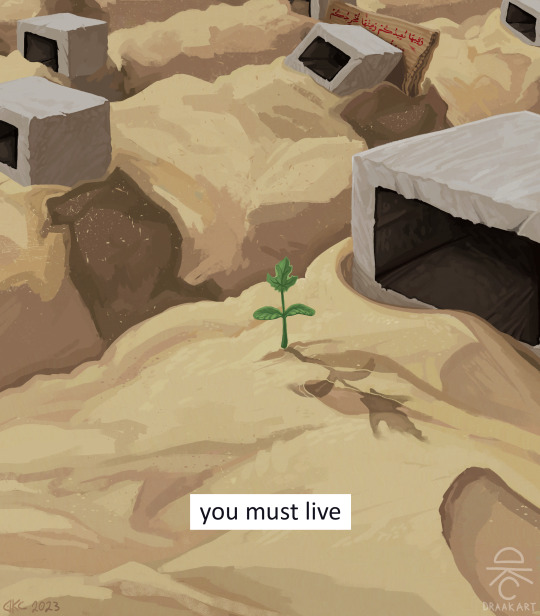
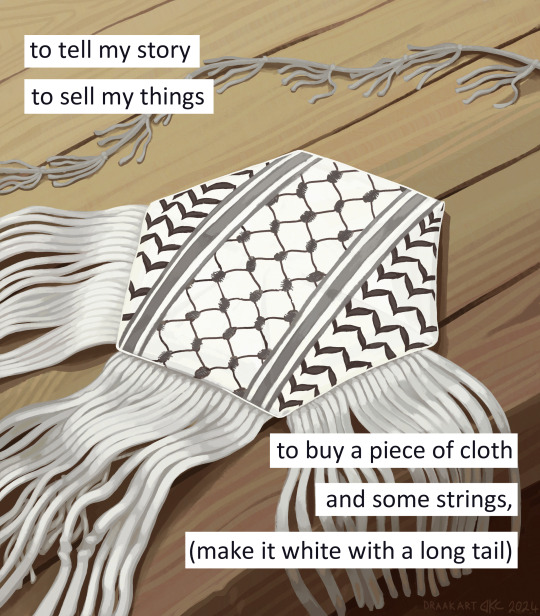
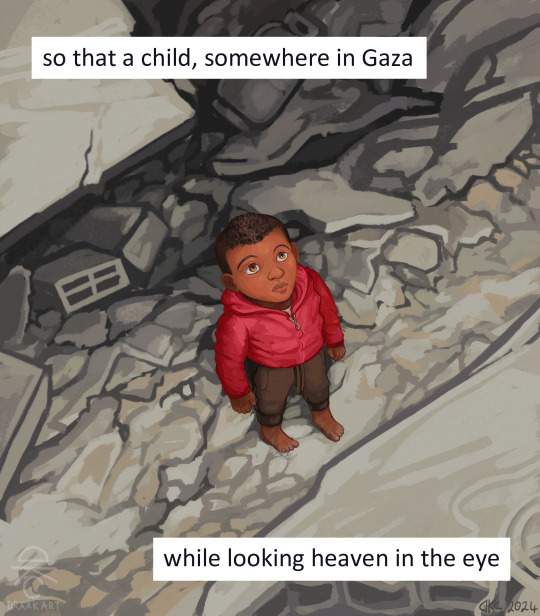




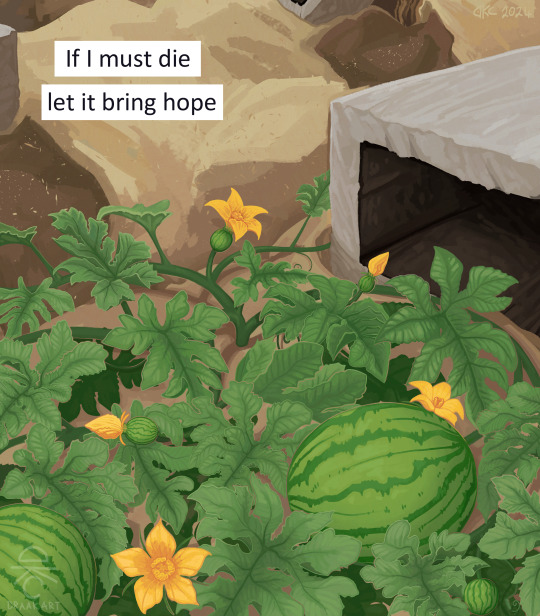
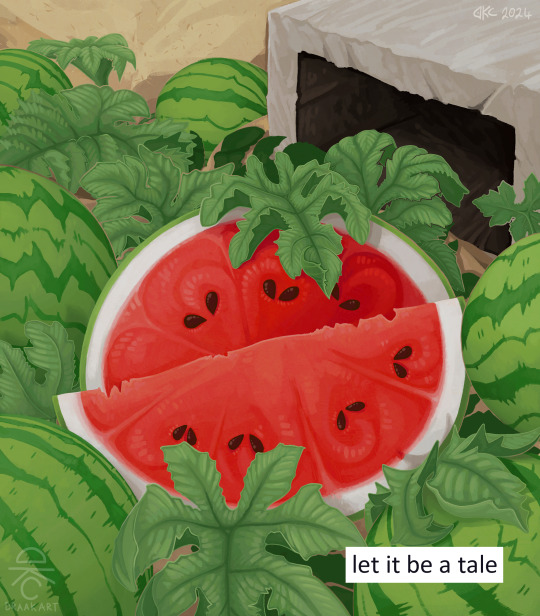
If I must die, let it bring hope
Let it be a tale 🪁🍉🇵🇸
resources below!🕊️
DONATE:
Buy an eSim for someone in Gaza
The Palestine Children's Relief Fund
IG: @thepcrf
Sulala Animal Rescue
IG: @sulalaanimalrescue
Care for Gaza, a grassroots organisiation in Gaza that gives care packages to Gazan families
United Nations Relief and Works Agency for Palestine Refugees
Operation Olive Branch
GET INVOLVED:
Join your local rallies!
Australia Palestine Advocacy Network (APAN)
Twitter: @APAN4Palestine
IG: @apan4palestine
Justice for Palestine Magan-djin (Brisbane)
FB: justiceforpalestinebrisbane
IG: justiceforpalestine.magandjin
Justice for Palestine Melbourne
FB: FreePalestineMelbourne
IG: freepalestinemelb
Friends of Palestine (Western Australia)
Wage Peace, Disrupt War (Australia)
IG: disruptwars
BOYCOTTS:
Boycott, Divestment, Sanctions
Boycott, Divestment, Sanctions Australia
LEARN:
Decolonise Palestine
If you have any additional resources or funds that aren't listed, let me know and I will endeavor to add them on.
170 hours later and this behemoth project is completed. After being moved to tears three times by Dr. Alareer's poem, I needed to create something. Hopefully this honours his memory.
Hoping to get some funding from local orgs to get this printed into a physical booklet for distribution.
From the river, to the sea!
#free gaza#palestine#if i must die#refaat alareer#apartheid#artists on tumblr#digital art#draakart#2023#2024#watermelon#kite#kufiya#keffiyeh#such a relief to have finished this body of work
14K notes
·
View notes
Text
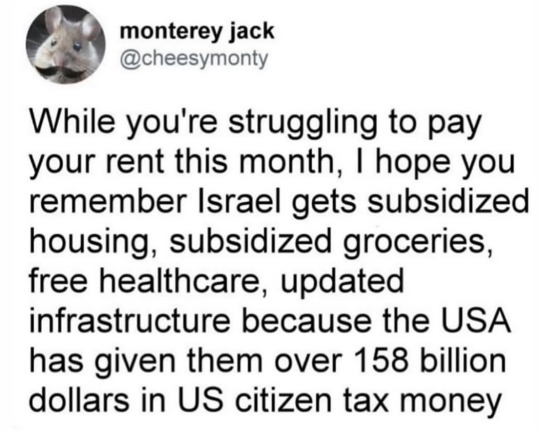
"There's a Palestine that dwells inside all of us, a Palestine that needs to be rescued: a free Palestine where all people regardless of color, religion, or race coexist; a Palestine where the meaning of the word "occupation" is only restricted to what the dictionary says rather than those plenty of meanings and connotations of death, destruction, pain, suffering, deprivation, isolation and restrictions that Israel has injected the word with"
-- Refaat Alareer, from Gaza Writes Back
#palestine#free gaza#free palestine#freepalastine🇵🇸#we stand with palestine#ceasefire#gaza strip#israel#gaza#usa news#usa#twitter#quotes#phrases#quotes of the day#life quotes#refaat alareer#us politics
9K notes
·
View notes
Text
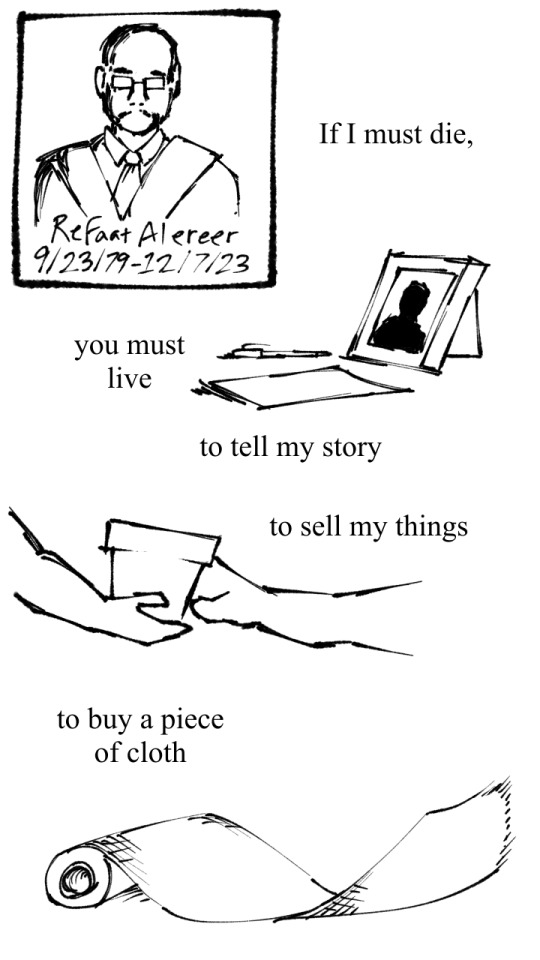
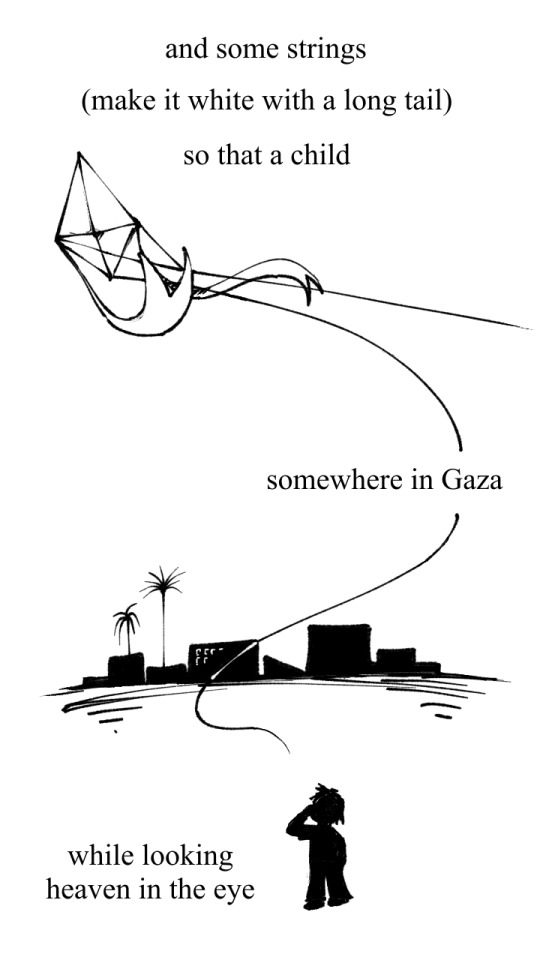

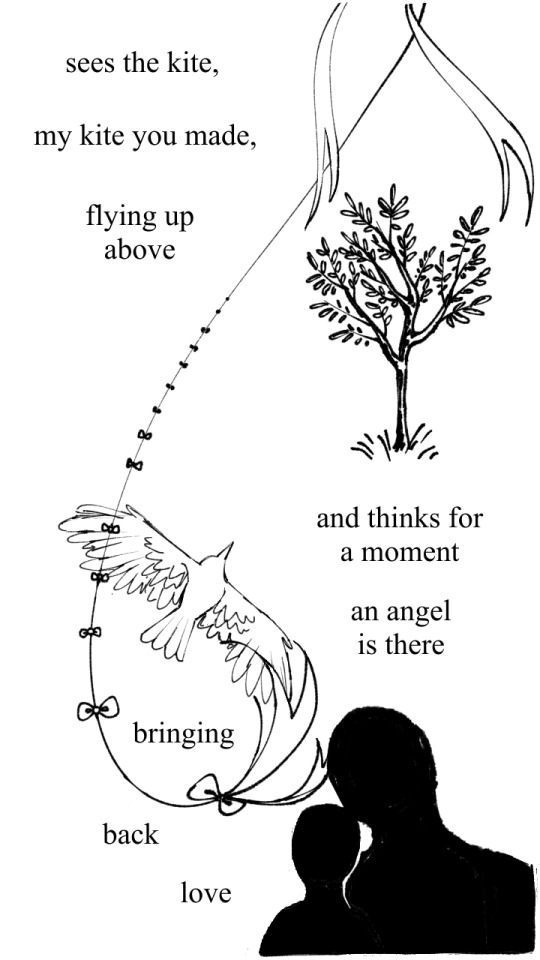
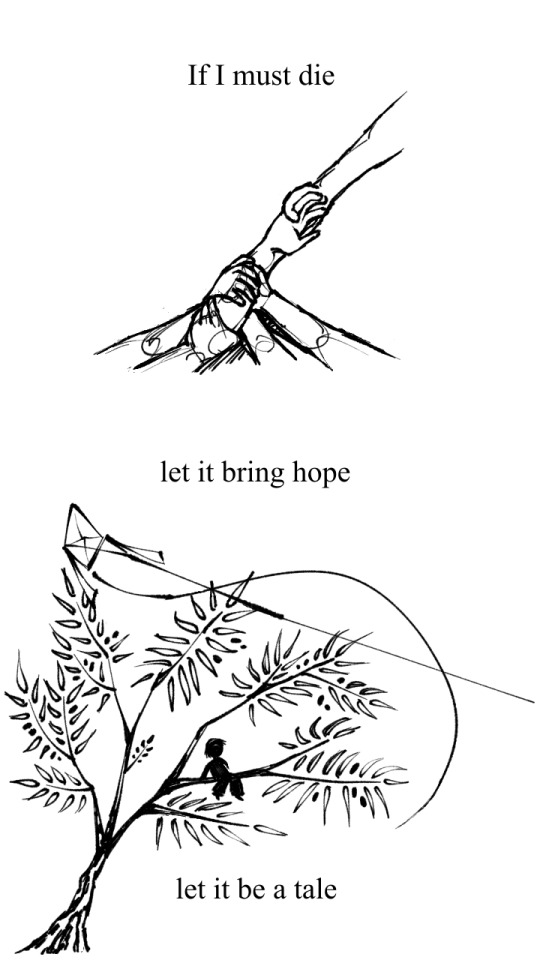
Refaat Alereer: If I die, let it be a tale
10K notes
·
View notes
Text

#yemen#jerusalem#tel aviv#current events#palestine#free palestine#gaza#free gaza#news on gaza#palestine news#news update#war news#war on gaza#refaat alareer
8K notes
·
View notes
Text

(Dec. 7)
Refaat Alareer's Youtube channel
9K notes
·
View notes
Text
Brian Cox reads “If I Must Die” by beloved Palestinian poet, teacher and martyr Refaat Alareer.
Refaat was killed on December 7th by an Israeli airstrike. This was the last poem he published.
#refaat alareer#palestine#poetry#brian cox#i linked the original tweet by @palfest and you can also find the video on their youtube channel also @palfest
6K notes
·
View notes
Text

this is unbearable. just a little while ago when the baby was born we were lamenting that refaat never got to meet his grandkid and now his grandkid, son in law, and daughter are dead too?! ايه القهر ده!
3K notes
·
View notes
Text
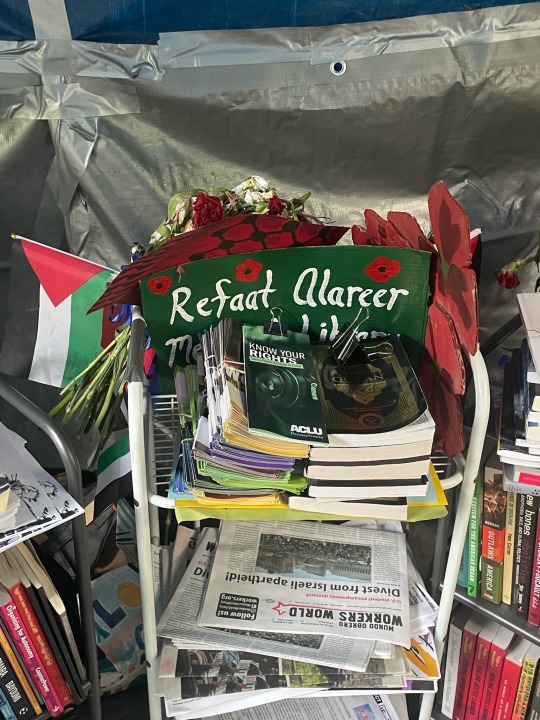
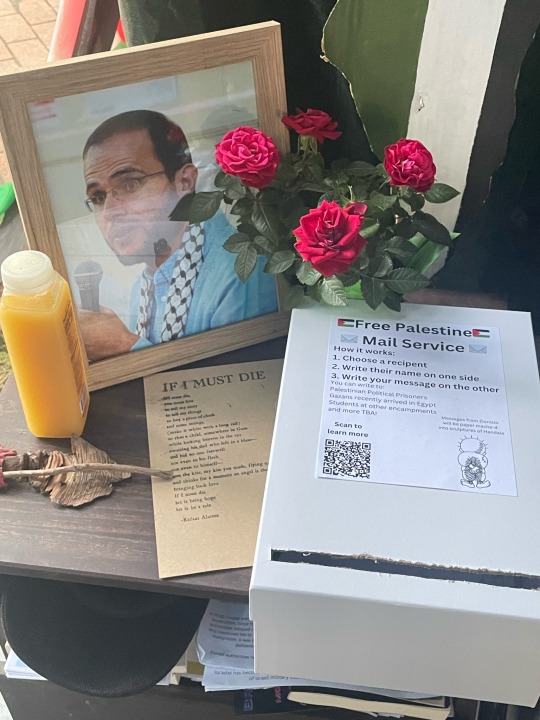
Reporting from the Refaat library at the UPenn encampment
2K notes
·
View notes
Text
Palestinian poet, Refaat Alareer

#Refaat was killed in an Israeli airstrike on 7 December 2023#rest in power Refaat Alareer#rip#Refaat Alareer#if i must die#let it be a tale.#palestinian art#it’s so strange to continue life while a genocide is happening right before our eyes#free palestine#palestinian genocide#think of others#free gaza#palestine#poetry#palestinian poetry#writers and poets#poem#poems#writing#prose#stand with gaza#gazaunderattack#gaza#gaza genocide#gaza strip#pray for gaza#israel#palestinians#poems and quotes#poetic
3K notes
·
View notes
Text
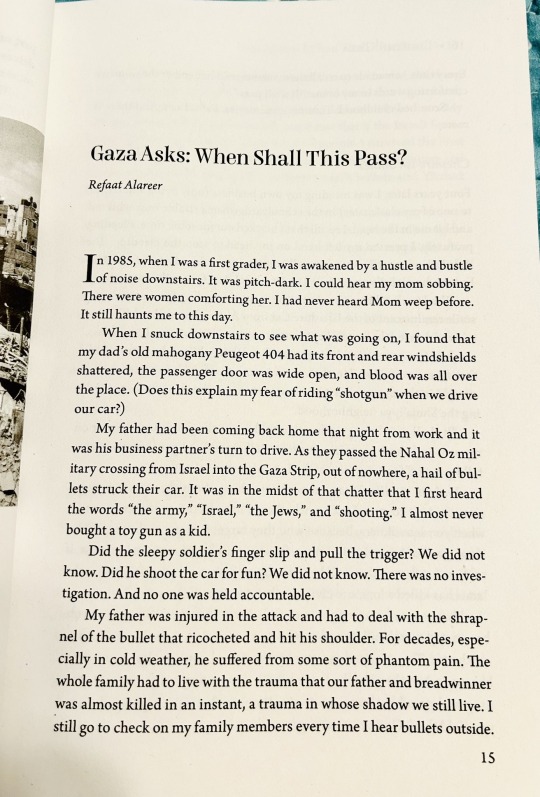
read the e-book for free here
4K notes
·
View notes
Text
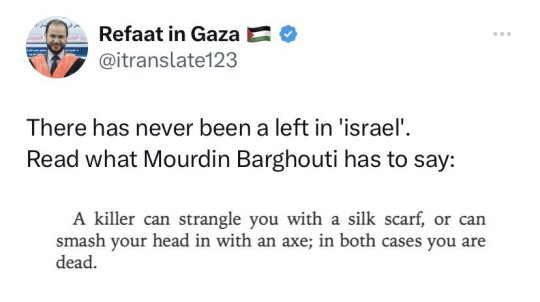
This is actually a great response to people like Bernie Sanders who keep insisting Bibi Netanyahu is the real problem and, if he were removed from power, things would get better.
Bibi’s a monster, no doubt. But they probably wouldn’t.
His opponents dislike him because he’s incredibly corrupt and can’t/won’t get the hostages back.
But very few of them really object to his view on the Palestinians. At most, they wish he was a bit more subtle about his genocidal tendencies.
#bibi netanyahu#refaat alareer#gaza#free palestine#columbia university#literature#democrats#republicans#politics#Israel#bernie sanders
2K notes
·
View notes
Text

If I Must Die by Refaat Alareer
Palestinian poet, writer, literature professor, and activist Dr. Refaat Alareer was killed on December 7th, 2023, in a targeted Israeli airstrike that also killed his brother, his sister, and four of her children.
Dr. Alareer was a beloved professor of literature and creative writing at the Islamic University of Gaza, where he taught since 2007.
This poem has been pinned to his twitter profile since November 1st, 2023.
2K notes
·
View notes
Text

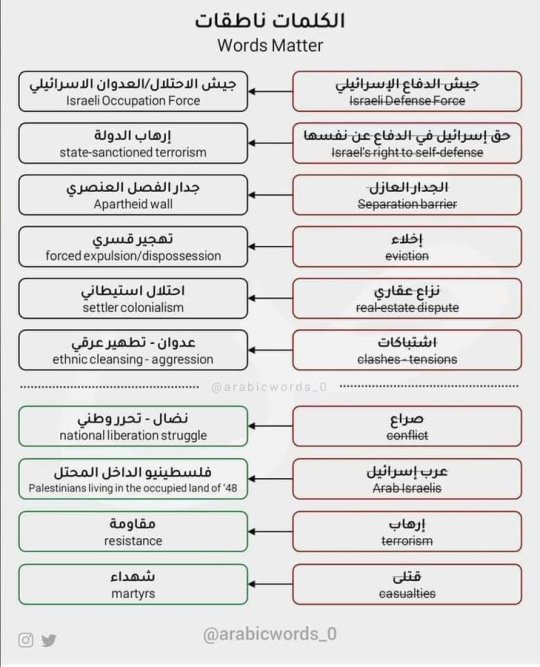
#yemen#jerusalem#tel aviv#current events#palestine#free palestine#gaza#free gaza#news on gaza#palestine news#news update#war news#war on gaza#languages#refaat alareer#end the occupation
3K notes
·
View notes
Text
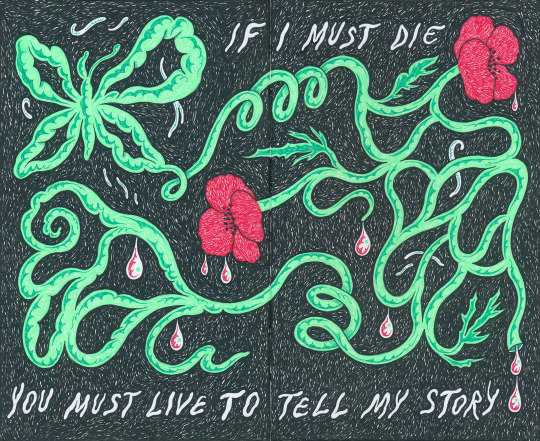
Words by Palestinian writer Refaat Alareer (1979-2023). The poem in full:
If I must die,
you must live
to tell my story
to sell my things
to buy a piece of cloth
and some strings,
(make it white with a long tail)
so that a child, somewhere in Gaza
while looking heaven in the eye
awaiting his dad who left in a blaze—
and bid no one farewell
not even to his flesh
not even to himself—
sees the kite, my kite you made, flying up above
and thinks for a moment an angel is there
bringing back love
If I must die
let it bring hope
let it be a tale
1K notes
·
View notes
Text
The Toronto Public Library has removed "If I Must Die" by Palestinian writer, poet, professor and activist Refaat Alareer from its display.
If you're an author, writer, academic or reader you can contact TPL to voice your opinion on this decision to censor Palestinian poetry. Who to email here and here.
#refaat alareer#palestine#gaza#gaza genocide#tpl#toronto public library#canada#direct action#reblog/bookmark for later#it takes 5 mins to send an email in support of refaat's poetry
889 notes
·
View notes
Text
"How many of you like have you ever been to Jerusalem? Raise your hand if you have ever been to Jerusalem. We have 60 students here, and we have one... two, probably three... That's that's very few of you! I've never been to Jerusalem. We're Palestinians; we live in Gaza; we can't go to Jerusalem because of the Israeli occupation.
But we love Jerusalem, right? [A chorus of students saying "yes".] We love Jerusalem because of what it means to us. We've never been there, but believe me, when you go there you will feel that you've been there hundreds of times. Because you read about Jerusalem in literature, in stories. Of course it doesn't mean that that's it, that we should take the Jerusalem that's in the stories and that's it, no.
But in literature, Jerusalem comes back to us. It's true that there is suffering; there is pain; there is occupation, and that's why Tamim Al-Barghouti, as a young Palestinian poet, I think is doing a great service to the Palestinian cause and the Palestinian struggle.
When you listen to him reciting his poem from Al-Quds, or other poems, he takes you to Jerusalem. You live in Jerusalem. He takes you back to it. You liberate it for just a little bit of time.
And if there is hope; if you can imagine a free Palestine, a free Jerusalem, probably you will work towards that, and the same thing applies to occupied Palestine. We've never been to other parts of Palestine because of the Israeli occupation, but we've been told so many times by our parents and our grandparents, especially our mothers, they've been telling us stories about Palestine in the past, the good old days, when Palestine was all beautiful, unoccupied, unraped.
Therefore, I say in in this case how our homeland turns into a story. In reality, we can't have it; we don't have it, but it can turn into poems, into literature, into stories, so our homeland turns into a story. We love our homeland because of the story. We love our homeland because of the story, and we love the story because it's about our homeland, and this connection is significant.
Israel wants to sever this relationship, for example between Palestinians and the land; Palestinians and Jerusalem, and other places and cities, and literature attaches us back - connects us strongly to Palestine, so in my thinking, this is a very significant thing that literature contributes to. Creating realities; making the impossible sound possible.
In real life, again because we are here in Palestine and Gaza, I'll be giving you examples from Palestinian and Arab literature so we can compare and make things clearer. We all know Fadwa Tuqan, the Palestinian poet - and please do not introduce her as Ibrahim Tuqan's sister, let's talk about her as Fadwa Tuqan and then somewhere else mention that, "by the way, Ibrahim Tuqan was her brother". Let's not throw her under the shadow of a man, even if it's her brother, who was a great poet, we can't deny that.
So this is Fadwa Tuqan, a Palestinian poet, 40 years ago or 50 years ago, writing poetry... Of course, we always fall into this trap of saying "she was arrested for just writing poetry!" We do this, even us believers in literature, "Why would Israel arrest somebody or put somebody under house arrest if she only wrote a poem?!"
So we contradict ourselves sometimes. We believe in the power of literature, changing life as a means of resistance, a means of fighting back and in the end we say, "She just wrote a poem!" We shouldn't be saying that.
Moshe Daya, an Israeli general, said that the poems of Fadwa Tuqan were like facing 20 enemy fighters. Wow.
She didn't throw stones; she didn't shoot at the invading Israeli military jeeps. She just wrote poetry. And I'm falling for that again, I'm saying "she just wrote poetry".
So this is what how Israel's dealing with Palestinian poets, and the same thing happened to Palestinian poet Dareen Tatour. She wrote poetry celebrating Palestinian struggle; encouraging Palestinians to resist, not to give up, to fight back. She was put under house arrest. She was sent to prison for years.
And therefore I end here with a very significant point. Don't forget that Palestine was first and foremost occupied in Zionist literature and Zionist poetry.
Palestine was presented as these things, I'll be mentioning some of them, but there's a contradiction here, there's a paradox always. "Palestine is a land without a people to our people without a land", "Palestine flows with milk and honey", "there's no one there, so let's go". We'll see how later on, how many even Jewish people were disappointed when they came to Palestine. Number one, there was no milk and honey, because "flowing with milk and honey" sounds like you're just going to be groping around, and milk and honey will be thrown at you - and there were people! There have always been people in Palestine.
The fact that Israel worked hard to ethnically cleanse Palestine, to kick Palestinians out, first and foremost in literature - yes, in politics and everything - shows how significant poetry is.
To sum up, Palestine was occupied metaphorically in the poem long before it was physically and militarily occupied in your life, so let's do the same. Let's fight back; let's restore Palestine in in our writings; in our poetry; in our stories."
-Professor Refaat Alareer explaining to his students the power of poetry as a means of resistance, and why the occupation targets poets, during one of his lectures at IUG.
#refaat alareer#free palestine#literature#poetry#i'm always in awe of him when i listen to him#i'm thinking of making summaries of his other lectures too though i'd rather people hear it from him
2K notes
·
View notes